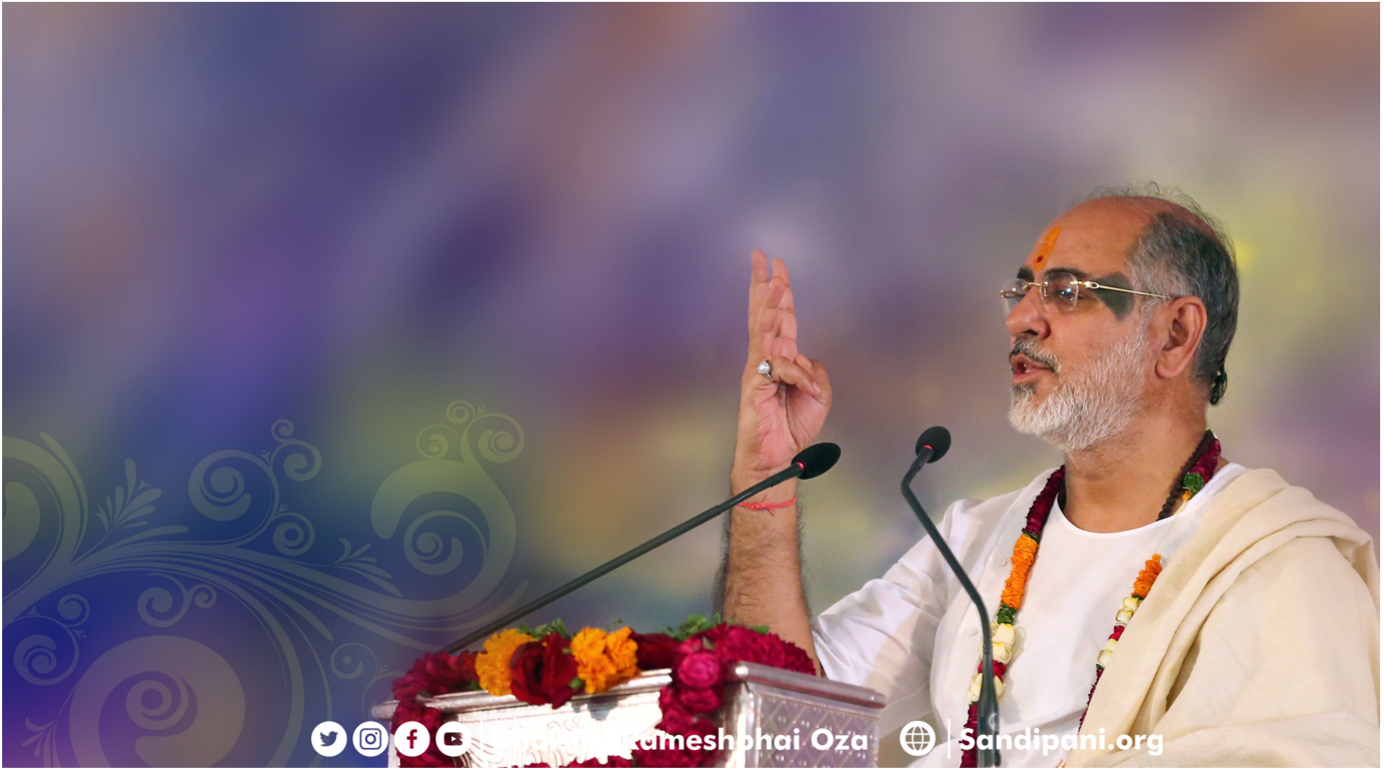A Sure Pathway to Establish Supreme Bliss In Your Heart
– Shlok of the Week – Shrimad Bhagavat – 1.1.2
To desire anything other than the Lord Himself from the Lord is duplicitous.
The code of conduct followed by non-envious, non-deceiving saintly personalities free of all desires (incl. that of liberation)
is called Bhāgavata Dharma. The exposition of this is the Śrīmad Bhāgavatam.
धर्मः प्रोज्झितकैतवोऽत्र परमो निर्मत्सराणां सतां
वेद्यं वास्तवमत्र वस्तु शिवदं तापत्रयोन्मूलनम् ।
श्रीमद्भागवते महामुनिकृते किं वा परैरीश्वरः
सद्यो हृद्यवरुध्यतेऽत्र कृतिभिः शुश्रूषुभिस्तत्क्षणात् ॥ १.१.२ ॥
श्रीमद्भागवत महापुराण १.१.२
dharmaḥ projjhitakaitavo’tra paramo nirmatsarāṇāṃ satāṃ
vedyaṃ vāstavamatra vastu śivadaṃ tāpatrayonmūlanam ।
śrīmadbhāgavate mahāmunikṛte kiṃ vā parairīśvaraḥ
sadyo hṛdyavarudhyate’tra kṛtibhiḥ śuśrūṣubhistatkṣaṇāt ॥
Śrīmad Bhāgavata Mahāpurāṇa 1.1.2
महामुनि व्यासदेवके द्वारा निर्मित इस श्रीमद्भागवतमहापुराणमें मोक्षपर्यन्त फलकी कामनासे रहित परम धर्मका निरूपण हुआ है । इसमें शुद्धान्तःकरण सत्पुरुषोंकेजाननेयोग्य उस वास्तविक वस्तु परमात्माका निरूपण हुआ है, जो तीनों तापोंका जड़से नाश करनेवाली और परम कल्याण देनेवाली है । अब और किसी साधन याशास्त्रसे क्या प्रयोजन । जिस समय भी सुकृती पुरुष इसके श्रवणकी इच्छा करते हैं, ईश्वर उसी समय अविलम्ब उनके हृदयमें आकर बन्दी बन जाता है ॥ २ ॥
☀️ Did-You-Know?
- None other than Śrī Veda Vyāsaji himself bears witness to this pathway to supreme felicity! The Lord is the trinity of existence-consciousness-bliss (Saccidānanda), and this very same Lord (Īśvara) is immediately captured and bound within the core of one’s heart the very moment one desires to listen to the Śrīmad Bhāgavatam!
- When the Śrīmad Bhāgavatam Mahāpurāṇa is an assured, attested and the most simply attained method of accomplishing the highest goal of human birth, what need is there to then seek other means (sādhan) to experience the supreme bliss, That Supreme Reality?
- Who is eligible for this most excellent of expositions? One who is free of the fault of ‘mātsarya’ or envy and insecurity of another individual excelling or ‘getting ahead’ (mat sarati, mat sarati) of them.
[To learn more about the nuanced difference between īrṣya (jealousy) and mātsarya (envy), click here to watch this lecture by Acharya Dr. Bharatbhai Shilu] - This freedom from fear of another’s progress is possible only in a pure heart in which the sincere desire for nothing but the Lord Himself has been awakened. A pure heart is focused on its ‘Self’ from the perspective of spirituality and is focused on the loving service of the One in all, from the perspective of interaction in the material world.
- All human pursuits are impelled by desires and the Ṛṣis have termed these to be ‘puruṣārtha.’ There are four key aims of one who wishes to live a fulfilled life- Dharma (righteousness), Artha (wealth), Kāma (indulgences) and Mokṣa (liberation).
- Desire for the Lord above all these human desires is the true mark of an aspirant who is free from all forms of deceit (niṣkapaṭa).
- There is no surer or swifter means to purifying one’s heart than to listen to an exposition of this scripture, the Śrīmad Bhāgavatam. This itself is the means (sādhan) and the goal (sādhya).
- The code of conduct followed by such purified souls (satpuruṣa), whose only aim is devotion for the Lord – in the form of universal existence – is called ‘Bhāgavata Dharma’.
- The threefold miseries which torment those within this material world – (Ādhīdavika, Ādhībhautika, Ādhyātmika) – are destroyed by their very root for those on this path.
- This same Śrīmad Bhāgavatam verse 1.1.2 by Śrī Veda Vyāsaji can be found in the Śrīmad Bhāgavatam Māhatmya (Padma Purāṇa v.6:81) spoken by his disciple and son, Paramhaṃsa Śukadevaji, who attests to the glory of this divine scripture!
❔Who says this verse in the Padma Purana?
🔔 Share your answer or a fun-fact in the comments section below.
About this Article
This is a part of an ongoing series to learn a Shlok a week from the Purushottam Maas Shrimad Bhagavat Katha by Pujya Bhaishri Rameshbhai Oza. We hope devotees are able to savour a few fun facts on these verses with an enhanced interest for the context and divine nuances through this series.
This Article is the 6th in the ‘Shlok of the Week’ Series.
Series by Rishi Harshitbhai Shukla (India);
Nimishaben Sadhu (India);
Rajeshbhai Purohit (UK).

